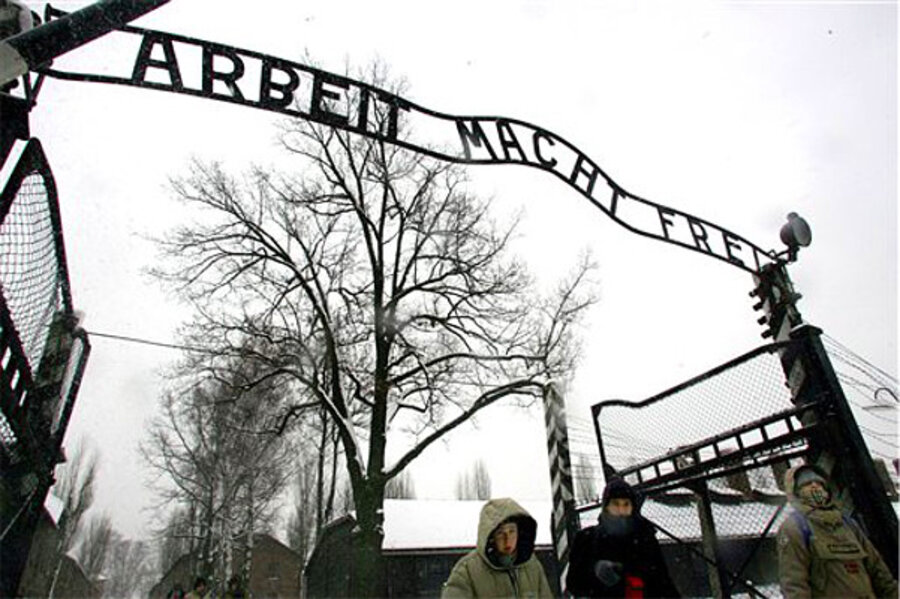Auschwitz guards could stand trial: Why new trials for old Nazis?
Loading...
| LUDWIGSBURG, Germany
The German special prosecutors' office that investigates Nazi war crimes said Tuesday it is recommending charges against dozens of alleged former Auschwitz guards, opening the possibility of a new wave of trials almost 70 years after the end of World War II.
Federal prosecutor Kurt Schrimm, the head of the office in Ludwigsburg, said an investigation of 49 suspects turned up enough evidence to recommend that state prosecutors pursue charges of accessory to murder against 30 people in Germany who were stationed at the death camp in Nazi-occupied Poland.
Another seven suspects who live outside the country are still being investigated, two could not be found, and one further case has already gone to prosecutors, he said. Those living abroad are in Austria, Brazil, Croatia, the U.S., Poland and even one in Israel, Schrimm said without giving further details.
The names and hometowns of the suspects were not released. Schrimm said the oldest suspect was born in 1916 and the youngest in 1926, meaning they could range in age from 86 to 97.
The cases are being sent to the responsible state prosecutors' offices in 11 of Germany's 16 states. It will be up to them to determine whether the elderly suspects — primarily men but also some women — are fit to stand trial and whether to bring official charges.
"The biggest enemy is time," Schrimm told reporters.
Accessory to murder charges can be filed under the same legal theory that Munich prosecutors used to try former Ohio autoworker John Demjanjuk, who died in a Bavarian nursing home last year while appealing his 2011 conviction on charges he served as a Sobibor death camp guard, Schrimm said.
Ukrainian-born Demjanjuk was the first person convicted in Germany solely on the basis of serving as a camp guard, with no evidence of involvement in a specific killing. Under the new legal argument, anyone who was involved in the operation of a death camp was an accessory to murder. Demjanjuk steadfastly maintained that he had been mistaken for someone else and never served as a camp guard.
Efraim Zuroff, the top Nazi hunter at the Simon Wiesenthal Center in Jerusalem, said the decision could mean even more cases will be opened against guards at the other five main death camps established by the Nazis.
"We commend the (prosecutors) for seeking to apply the precedent as widely as possible and hope that they will be able to find as many perpetrators as possible," he said in a telephone interview.
"It's only a shame that this kind of legal reasoning was not applied previously, because it would have led to many, many more cases of people who definitely deserved to be brought to justice."
Schrimm said that even guards who worked in a death camp's kitchens played a role in the facility's function as a site that existed for the purpose of mass murder.
Schrimm cautioned that the health of the suspects — and of possible witnesses — would make bringing them to trial difficult.
"I don't want to raise excessive expectations," he said.
The Nazis built six main death camps, all in occupied Poland: Auschwitz, Belzec, Chelmno, Majdanek, Sobibor and Treblinka.
The Auschwitz and Majdanek complexes also had labor camps associated with them, but Schrimm said the suspects in the current investigation all worked in the main death camp, known as Auschwitz-Birkenau.
As part of the investigation prosecutors surveyed anew the Auschwitz-Birkenau camp and concluded no one could have been there for more than a day or two without learning that people were being gassed to death and their bodies incinerated at the site, he said.
About 1.5 million people, primarily Jews, were killed at the Auschwitz camp complex alone between 1940 and 1945. Overall, about 6 million Jews died in the Nazi Holocaust.
Schrimm's office is now focusing on the other death camps, starting with investigating all former personnel at Majdanek. He said expects to announce results of the Majdanek probe within six months.
Investigators are also looking into former members of the so-called "einsatzgruppen" — death squads that were responsible for mass killings, particularly early in the war before the death camps were established, Schrimm said.
He said he did not see extending the Demjanjuk precedent, however, to the Nazis' network of hundreds of concentration camps — places like Dachau, Bergen-Belsen and Buchenwald — where many tens of thousands died but whose purpose was not solely extermination.
In cases of guards from those camps, prosecutors still need evidence of a specific crime in order to bring charges, he said.
Rising reported from Berlin







